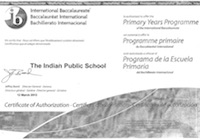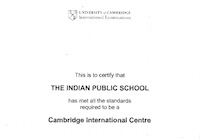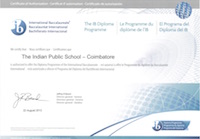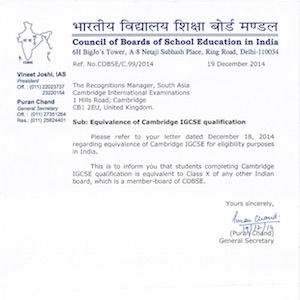At TIPS, we aim to give every child the very best start possible in their education through vibrant and engaging teaching. We enable the children to become active learners by offering challenging, broad and balanced International Baccalaureate and Cambridge curriculum programs.
Throughout the school we want our children to enjoy a wide range of academic and co-curricular experiences which bring the curriculum to life and make learning fun. All our facilitators ensure the best possible quality of education for the children in every year group. We help students learn in the ways that are right for them, nurturing a joy for learning and a passion to pursue their interests.
Affiliations
Recognitions
F.A.Q. IGCSE
Currently, in India we have around 300 schools offering IGCSE course. It is well recognized in India as equivalent to Grade X and used as a preparatory level for A Level, International Baccalaureate Diploma (IBDP) or State HSC. It is also equivalent to the Grade 10 examination of the CBSE and ICSE or the middle year Programme of the IB.
The purpose of IGCSE is to produce global citizens. The IGCSE curriculum is more challenging, but the challenge is in the quality of assignments, not in the quantity of the assignments.
The IGCSE has always emphasized adding value within a national context whilst also contributing to international level. The development focus is to safeguard distinctive cultural identity through specific language and literature syllabi, for example; or to include study of regional geography or history, whilst also encouraging an international outlook. Thus, the importance of an appropriate mix of global and local contexts is well recognized as an essential dimension of IGCSE.
- Provides an ideal foundation for higher-level courses such as the International Baccalaureate Diploma Programme, A Levels and the North American APT (Advanced Placement Test)
- Has worldwide recognition and is equivalent to the Certificate of Secondary Education from Indian education boards, General Certificate of Secondary Education, and O Level
- Offers syllabi which reflect local economies and cultures within a global context, hence ensuring that students gain a wide perspective while recognizing and valuing their own environment
- Develops key learning, problem-solving and investigative skills by encouraging an active, critical and questioning approach to study
Ensures a broad-based education, while encouraging a degree of choice.
A*,A, B,C,D,E,F and G.
(Grade A* is awarded for exceptional levels of achievement).
To take account of differing abilities, there is a choice between Core and Extended curriculum papers in most subjects. This allows teachers to decide on the most appropriate level of papers for their students.
The Core curriculum in each subject is within the ability range of a large majority of students. It provides a full overview of the subject and is targeted at students expected to achieve grades C to G. The Extended curriculum, which comprises the Core curriculum and the Supplement, has been designed for the more academically able and leads naturally into higher education or professional training. It is targeted at those expected to achieve grades A to E.
| GRADES AVAILABLE | |
| Core Curriculum | C D E F G |
| Extended Curriculum | * A B C D E |
The overlap of three grades (C, D and E) is designed to accommodate students who perform either better or worse than their teachers expectations. Students who fail to meet the minimum satisfactory standard for either the core curriculum (Grade G) or the Extended curriculum (Grade E) will be marked (U).
- Mathematics (Without Coursework)
- English as a Second Language
- First Language English
- Biology
- Physics
- Chemistry
- Geography
- Literature (English)
- Business Studies
- Information and Communication Technology
SUBJECTS OFFERED AT TIPS
- Science Stream: English; Mathematics; French / Hindi; Physics; Chemistry; Biology; Economics; Information Technology.
- Commerce Stream: English; Mathematics; French/Hindi; Combined Sciences; Economics; Information Technology / PE.
From the year 2015, in India the Examinations are held in the month of March with results is May.
Yes, it is recognized by CBSE, CISCE and state education boards in India as a qualification for entry to class XI or for other higher secondary education courses. It is also recognized as class X qualification, as one of the prerequisites, for admission to undergraduate courses in India. The latest Indian recognition details can be viewed at:
https://www.cambridgeinternational.org/Images/301400-india-recognition-statements-as-level.pdf
They can also opt for A level programme in any other International school that offers the same.
IGCSE also qualifies the students for admissions in all the Indian +2 boards (ISC/CBSE/HSC). IGCSE students are eligible for admission to local and national boards through both online and offline.
It is pertinent to note that students who completed IGCSE can pursue IB Diploma programme as the most suitable option. The skill set inculcated in IGCSE are well suited to any International program, IB or A-Levels.
However, we agree that the SSC students are granted marks very leniently including internal and sports marks. But all reputed colleges have accepted IGCSE and students are admitted for HSC. Even IGCSE students are allowed to fill online application form for HSC admission.
F.A.Q. IB
There are just 40 IB World Schools in all over India. The list of authorized schools is available on the IBO website www.ibo.org.
There are a wide range of courses designed to meet the interests and requirements of different students. In addition to the courses offered, it is unique because only the IBDP includes the Creativity, Action and Service (CAS) program, the Extended Essay and the Theory of Knowledge course. Together these offer IBDP students experiences and skills they will not find in any other program.
Group 1: First Language (English)
Group 2: Second Language (French ab initio, Hindi, etc)
Group3: Individuals and Societies (History, Economics, Business and Management, etc)
Group 4: Sciences (Biology, Chemistry, Physics and Environmental Systems)
Group 5: Mathematics and Computer Science
Group 6: Electives (either Visual Arts or a second subject from Groups 3, 4 or 5)
In addition, all DP students must study a two-year course called Theory of Knowledge (TOK); work to produce on Extended Essay (EE); and engage in Creativity, Action, and Service (CAS).
- Areas of strength
- Future career
- University requirements for each country
The Extended Essay is an original independent research leading a DP student to produce a
Comprehensible written piece of 3,500-4,000 words in any chosen subject and title.
Under Creative, Action and Service (CAS), each DP student must complete at least 150 hours of work spread over one-and-a-half years, engaging in some form of creativity, participating in sport or other physical action, and doing social service.
For further inquiries contact: dp.online@ibo.org
IB examinations test students’ knowledge, not their memory and speed. There are no externally evaluated examinations till the Middle Years Program (Class 10). The focus of the IB pedagogy is on ‘how to learn’ rather than ‘what to learn’.
The purpose of the IB is to produce global citizens, but it can be well-integrated with the local curriculum. Hindi can be offered as a second language in the IB Diploma Program.
The IB curriculum is more challenging than educational boards like the CBSE and ICSE. The challenge is in the quality of assignments, not in the amount of work assigned.
The Association of Indian Universities (AIU) rates the IB Diploma at par with Class 12 CBSE, ICSE, NIOS or State Boards. Many educational institutions and colleges have published their policies and entry criteria for IB students on their websites. For example, Delhi University colleges have specified their conditions for entry of IB students. The in
formation is also available on the IBO website www.ibo.org
Universities in over 110 countries recognize the IB Diploma and it will allow entrance to the most competitive universities around the world. The university admission authorities recognize the academic rigor of the IBDP, and value the “extra” parts of the Diploma, such as TOK, CAS and the Extended Essay.
- Most universities in Europe require the full Diploma as a qualification for entry.
- Higher Level Courses are broadly equal to British A-Level courses.
- Higher Level courses are considered equivalent to American Advanced Placement (AP) courses
Successful IB Diploma students may be offered credit (particularly for Higher Level courses and TOK) for first year university courses in Canadian and American Universities overseas.
- The IB Diploma has earned universal reputation for rigorous assessment, giving students access to the top colleges and universities in India and the world. IB is fast becoming the program of choice for Indian students preparing to pursue higher education abroad.
- The IB curriculum equips students with the tools needed to succeed in higher education, such as self-confidence, preparedness, research skills, organizational skills and being actively engaged in self learning.
- Most universities even offer scholarships to IB diploma holders.
- University admissions around the world are getting competitive by the day. Admission officers are increasingly looking for other evidence that a student will succeed in the university – such as exposure to quality curriculum, research abilities, an international outlook and social service – all enhanced by the IBDP
All curriculum documents are reviewed on a seven-year cycle. This cycle is not fixed and if significant change occurs in a body of knowledge (for example, computer science), then changes will be introduced more quickly. The cycle allows for:
- Worldwide research by curriculum personnel
- Design of curriculum models through consultation with practitioners in IB World Schools
- Presentation of draft documents to the Diploma Program committee and IB World Schools
- Analysis of feedback before final publishing, training of teachers and then teaching and examining of the new curriculum.
- At the end of the two-year program, students are assessed both internally and externally in ways that measure individual performance against stated objectives for each subject.
Some assessment methods include portfolios/dossiers, written essays, studio-work, experimental work, oral commentaries, as well as written exams and are tailored for different learning styles.
Considering that exams may or may not reflect what a student really knows and what he or she is able to do, having a variety of assessment tools allows the IB organization to fairly assess the student’s true ability.
In addition, the grading system for all the IB programs is criterion-referenced, to allow each student’s performance to be measured against well-defined levels of achievement. Assessments with oral and written components are assessed by examiners worldwide and monitored by chief examiners with ample experience.
Statistically speaking, most students who earned the IB Diploma worldwide were of average or above average ability. It is not a program designed only for geniuses. What the IB program requires students to have are a strong work ethic, good time-management and solid study skills. The IB program offers courses at different levels (Higher Level and Standard Level). In addition, language courses range from introductory level to native-speaker level.
Due to the fact that the requirements of individual universities or countries are constantly changing, the School cannot guarantee recognition of the IB Diploma or IB certificate. It is sole responsibility of students and their parents to verify the university/country requirements prior to initiating the IB Program. The IBO website provides a searchable database of countries and their recognition policies. It is strongly recommended that parents contact the universities directly to verify that the information is up to date. Visit the International Baccalaureate Organization’s website (http://www.ibo.org) for more details.
- Excited and enthusiastic about learning, Self-motivated, mature, self-disciplined and goal oriented
- Fluent in written and oral communication
- Strong study and organizational skills and an efficient time manager Intellectually inquisitive and creative
- An independent, critical thinker
- Performing well academically
- Capable in math
F.A.Q A-levels
Cambridge Advanced stage which is in alignment with the Indian 11th and 12th grade curriculum.
Cambridge International AS Levels have half the content of the corresponding Cambridge International A Level and may be completed in one year. Schools can offer Cambridge International AS Level as a qualification in its own right or as a stage on the way to Cambridge International A Level. Learners can study Cambridge International AS Level alongside other subjects to increase breadth in the curriculum and build further knowledge and understanding to other subjects they are studying at Cambridge International A Level.
‘A’ LEVEL SUBJECTS OFFERED AT TIPS
Commerce Stream : English; Math; Accounts; Business studies; Economics.
Science Stream : English; Physics; Chemistry; Math/Biology.
F.A.Q. – Checkpoint
Cambridge Checkpoint tests are available in English, Mathematics and Science. Checkpoint is not a formal qualification with a certificate, although a Statement of Achievement is produced. There is no failing or passing in this test. It is a way in which CIE can help students make the most of their educational opportunities.
- Tailor individual student’s learning programmes
- Monitor group and individual performance
- Provide information for reporting to parents
- Compare the performance of all students taking tests in that session
- Manage learning programmes within centers as students move between centers
- Predict performance in student’s formal examinations
| Checkpoint Score Range | Probable IGCSE Score Range |
| 0 and 1
1 and 2 2 and 3 3 and 4 4 and 5 5 and 6 |
F
E D C B A / B |








